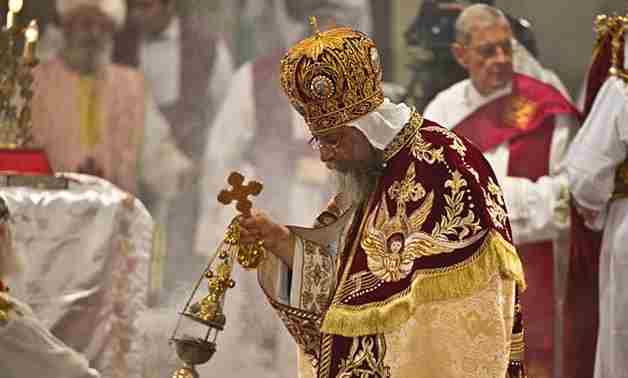Concepts Pertaining to Orthodox Worship (3)

4- Why does the Orthodox Church
Burn incense?
Many contemporary churches incorrectly suppose that the burning of incense was adopted by early Christians because of the influence of pagan practices within the Roman Empire. However, there are many Old and New Testament references which clearly demonstrate that the burning of incense is an acceptable Judeo-Christian practice.
1- In the Old Testament, God commanded Moses to build an altar for incense to be placed within the tabernacle. The priests were then instructed to offer incense every morning and evening to accompany the daily offerings. Interestingly, the Orthodox Church continues to practice this ancient rite through the Vesper (evening) and Matins (morning) daily raising of incense.
Raising of incense was a sacred act reserved for the priests of the Old Testament. Korah and his companions were swallowed by the earth when they offered incense to God incorrectly (Num. 16).
2- There is no evidence that the practice of raising incense should cease in the New Testament. On the contrary, there are number of references which demonstrate that the raising of incense is part of Christian worship. The Prophet Malachi prophesied about the Christian era saying, “For from the rising of the sun, even to its going down, My name shall be great among the Gentiles; In every place incense shall be offered to my name” (Mal. 1:11). This is a significant prophecy, because in the Old Testament, incense was to be burned in only one location – in front of the altar of incense. Obviously, this prophecy would be a fallacy if the burning of incense in the New Testament was to cease as many contemporary churches claim.
3- If the burning of incense was to cease, why did the Magi offer our Lord Jesus Christ frankincense? The Magi did not offer frankincense out of ignorance, but were led by Holy Spirit to offer gifts that would foreshadow the life of the new born King. Specifically, frankincense was foreshadowing that Jesus Christ would serve as High Priest (Heb. 9), because only priests were allowed to burn incense.
4- There are also references which show the burning of incense will continue in the afterlife, so it is not only an earthly practice, but a heavenly one as well. In Rev. 5:8, St. John witnesses that 24 priests fall down before the Lamb “each having a harp, and golden bowls of full of incense, which are the prayers of the saints.” Furthermore, he also states that he saw an angel “having a golden censer, came and stood at the altar. He was given much incense, that he should offer it with the prayers of all the saints upon the golden altar which was before the throne” (Rev. 8:3,4). If God permits the burning of incense in heaven, on what basis do contemporary churches forbid this practice on earth?
5- Incense is another means by which the church stimulates the senses of the worshipper. The pleasant aroma and smoke produced from burning incense are symbols of the pleasant fragrance of prayer and the mysterious nature of God’s presence.
6- As discussed in the previous point, the offering of incense by the 24 priests represented the prayers of the saints (Rev. 8:3,4). Similarly, King David asks God to “Let my prayer be set before You as incense…” (Psalm 141:2), so there is clearly a strong link between the burning of incense and prayers. Furthermore, the pleasant aroma of burning incense which lingers on the clothing of the worshipper serves to remind the believer that “…we are to God the fragrance of Christ…” (2 Cor. 2:15) – a fragrance that Christians are called to diffuse to their families and communities.
7- The fragrance also serves to remind the believer of their offering before God and God’s acceptance of their sacrifice. Incense burns in order to produce its smell just as one sacrifices his self for the love of Christ in order to gain the kingdom as the Lord said, “He who finds his life will lose it, and he who loses his life for My sake will find it” (Matt. 10: 39). Just as humans are pleased with enjoyable scents, the scripture personifies God by mentioning that an acceptable sacrifice produces an aroma that is pleasing to God (Gen. 8:21, Lev. 1:9, Lev. 23:18).
8- The smoke of the incense is representative of the Lord’s presence in the church. God was frequently manifested to the Israelites in the form of clouds of smoke (see Ex. 33:9-10, Matt. 17:5) For example, when God spoke to Moses on Mt. Sinai, God said, “Behold, I come to you in the thick cloud…” (Ex. 19:9). We can see the same scene in the event of Transfiguration and in the prophecy regarding coming to Egypt (Is. 19:1).